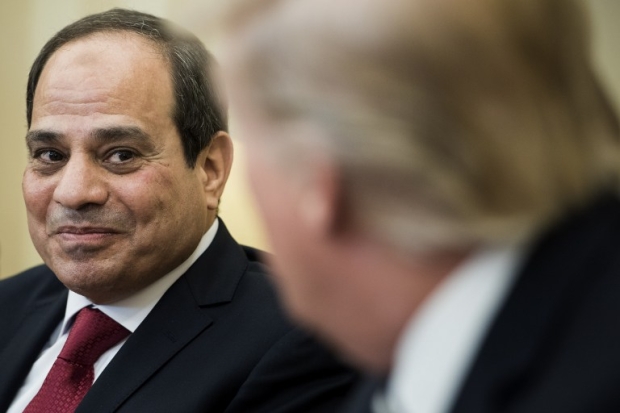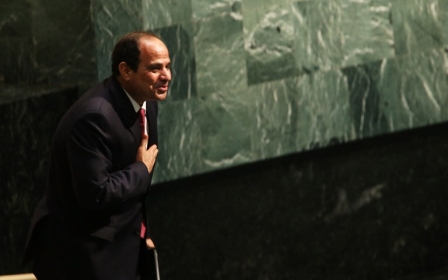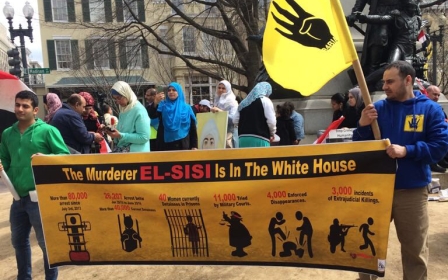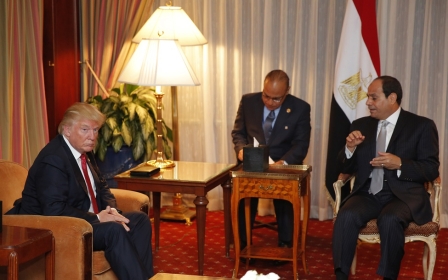A Trumpisi is born
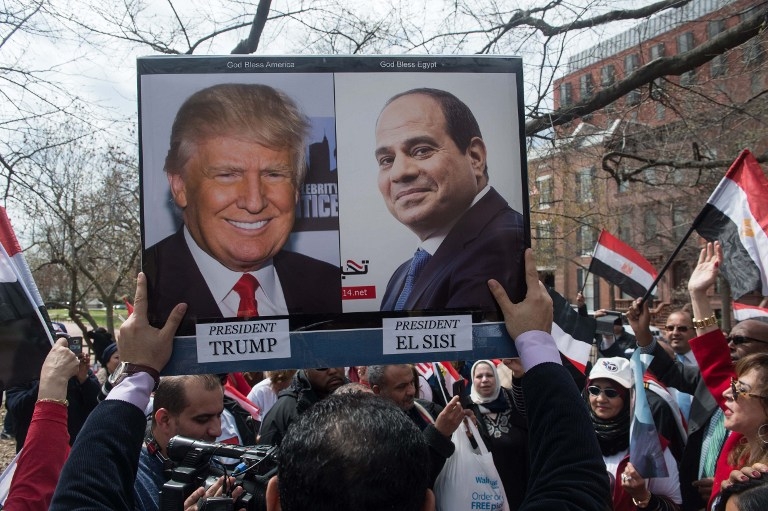
The start of the working week in Washington brought a “fantastic guy” face to face once again with that self-described deal-maker extraordinaire. The result: Trumpisi is born.
The meeting of Egyptian President Abdel Fatah al-Sisi and US President Donald Trump was a meeting of like minds, albeit inexperienced ones further deflated by their own inflated egos.
Can the Trumpisi right the course of an Egyptian-American relationship that fractured under the Obama presidency?
It was the first visit to the White House by an Egyptian president since 2009 after the Obama administration tried to distance itself first from former president Hosni Mubarak and then Sisi, though analysts contrasting Obama’s tenure with Trump’s pro-Sisi stance would be whitewashing the Obama legacy.
Obama did not call what happened in July 2013 a coup. He gave Sisi his money. And most glaringly, he did not take a powerful position on the Rabaa massacre that left more than a 1,000 dead.
Still, despite the fact that both their domestic and foreign fronts are speckled with blemishes, the meeting was a continuation of a love-at-first-sight dynamic that started when the two first met while Trump was still on the campaign trail last year.
One man’s iron-fisted leader is another man’s dictator. The former is how Sisi supporters view him while many in the West see the Egyptian president as the latter.
Those critics in the West would not include Trump who upon meeting his Egyptian counterpart on Monday declared the “two will work closely together on terrorism” with admiration duplicated by Sisi who spoke of Trump’s “unique personality”.
But what lies beneath may not congeal as well as this week’s superficial public relations win for Trumpisi.
Secret sweating
Both presidents are haemorrhaging domestic support. Trump’s highest approval rating so far, a measly 46 percent, took a dive in late March to 37 percent, largely as a result of suspicions of collusion with Russia, failure to pass his health care bill and two disastrous attempts at a Muslim ban.
Publicly confident, both men must be sweating behind closed doors
Sisi, meanwhile, was purportedly elected by 97 percent of a low 47 percent voter turnout on the back of a gloomy domestic picture. From an August 2016 approval ratings of 82 percent, it fell in two months to 68 percent, a drop of 14 percent in only 60 days and, by the standards of most dictatorships, a worrying low.
And that was days before the Sisi regime took its biggest risk yet by devaluing the Egyptian pound and exploding a 14 percent inflation rate to over 30 percent by the end of February.
As the economic crisis has taken a turn for the worse, it is hardly worth asking how many Egyptians approve of the IMF-inspired austerity measures that have seen food prices skyrocket by 40 percent. It is no wonder that the usually bimonthly Baseera poll has gone silent since November.
With this unpropitious backdrop, this meeting of the self-inflating Trumpisi took on a paramount significance. Publicly confident, both men must be sweating behind closed doors.
Fighting talk
Defeating "radical" Islam is a centrepiece for the two leaders, a point of intersection, both politically and ideologically.
Trump applauds Sisi as the Arab Muslim vanguard of anti-Islamic State group actors in the region, while Sisi looks to his American counterpart to list the Muslim Brotherhood as a terror organisation. But a quid pro quo is by no means a certainty and there was no mention of the Muslim Brotherhood on Monday.
Sisi may pontificate about his fight against militants. Meanwhile, he is losing in his own backyard. In northern Sinai, the IS-affiliated group formerly known as Ansar Beit al-Maqdis conduct terror operations every day, with a major attack leaving 10 dead just 10 days ago.
For many analysts, the link between Sisi’s oppression and the jump in terrorism is undeniable. “After the crackdown in Rabaa, there was a significant change in the insurgency’s intensity and scale operations,” according to Omar Ashour, a senior lecturer at the University of Exeter.
Low return
In fighting terror, Sisi is all talk. Just search the battlefields in Iraq and Syria where the war against IS is at a fever pitch. “Last I checked there are no Egyptian F16s helping us fight ISIS over Raqqa and Mosul,” former assistant secretary of state Tom Malinowski said last week.
Why should Trump risk undercutting America’s standing in various Middle Eastern capitals by declaring the Muslim Brotherhood a terrorist organisation?
Without a return on investment, why should Trump risk undercutting America’s standing in various Middle Eastern capitals by declaring the Muslim Brotherhood (MB) a terrorist organisation?
Beyond the deal making, career officers at the State Department have made it clear that such a declaration against the Brotherhood, especially after the twin Muslim ban failures, would be perceived as further evidence that the US is fighting Muslims – including mosques, charities and groups - instead of terrorists, and would have negative domestic and foreign consequences.
“This would signal they are more interested in provoking conflict with an imaginary fifth column of Muslims in the US,” Malinowski said.
Sisi, accordingly, walked away without the big get: branding of the Brotherhood as a terrorist organisation. Instead, he received a pat on the back for a dictatorial style that, terrifyingly, appeals to Trump and diminishes both men.
Egypt’s prisoners
There are two other items that the two men potentially discussed, but only behind tightly closed doors.
First is the case of Aya Hijazi, an Egyptian-American advocate for street children who has been in jail for more than 1,000 days for state-invented crimes against children. The second issue is the more general sore spot of human rights, with over 60,000 political prisoners in Sisi’s jails.
Last week, Egypt’s semi-official paper Al Ahram included a snippet about 21-year-old prisoner Ahmed al-Khatib who has been struck by a deadly parasite and may be released for medical treatment. But you won't hear about him from Trumpisi, nor will you hear about award-winning photojournalist Shawkan, held since the Rabaa massacre in August of 2013, and now described as "severely anaemic and skeletal".
Bread protests, soaring prices, millions of unemployed, and an external debt mushrooming to $67bn - a mammoth increase of 41 percent in one annum? These don’t bother Trumpisi!
You won’t hear about these cases because, in the Trumpisi universe, human rights are not on the radar. The end for these men - the extermination of a jihadi brand of Islam, a crusade-like affair in the Trump mind - justifies the means. And so often, those means are a systematic trampling of human rights with an endorsement dipped in Washington’s inkwell of silence.
A nation that provides me with freedom of expression stands silent while other journalists, like Ismail el Iskandarani, languish in jail for more than 16 month, as the ultimate threat to the Sisi regime: an informational beacon on Sinai.
Trump, who has displayed utter distaste for oppositional journalism, is not bothered by the plight of the likes of Iskandarani and Shawkan. After all, acknowledging Shawkan would be an admission that he has been in a Sisi prison for more than three years, his only crime being his photo documentation of the war crimes which occurred at Rabaa.
The ongoing massacre of the Egyptian economy had to have figured prominently on Monday’s agenda. Even there, Trump likely went easy on Sisi. Trump will not accuse Sisi, as one academic has put it, of exploiting an IMF agreement “to squeeze the lower classes and enrich a small clique of former generals”.
Bread protests, soaring prices, millions of unemployed, and an external debt mushrooming to $67bn - a mammoth increase of 41 percent in one annum? These don’t bother Trumpisi.
Empty suits
To sum up bluntly, the Trumpisi meeting was a total charade. Trump gets to claim he has a supporter in the fight against terror and Sisi can publicly wear his Trumptonian seal of approval.
But can Sisi deliver for his new volatile friend? The Egyptian president has already angered multiple Gulf allies by failing to keep up his end of their bargains. Where Sisi is concerned, there is not necessarily a return on allies’ financial investments. Just ask Saudi Arabia and the United Arab Emirates.
But can Sisi deliver for his new volatile friend? Just ask Saudi Arabia and the United Arab Emirates
So far, so good. Or “fantastic” in Trump’s assessment - which bares no relation to Egypt’s economic, security and human rights reality. Sisi had better hope that this autocratic handshake holds through stormy times ahead in Cairo.
Because in the end, Trumpisi are not brothers in arms, but lovers of conspiracy theories who view the world not through diplomatic glasses, but through a muscular prism, through a love of appearance, not substance.
But statesmanship, of course, is about the latter. Fail to deliver that and both risk becoming the ultimate “fake news”.
- Amr Khalifa is a freelance journalist and analyst recently published in Ahram Online, Mada Masr, The New Arab, Muftah and Daily News Egypt. You can follow him on Twitter@cairo67unedited.
The views expressed in this article belong to the author and do not necessarily reflect the editorial policy of Middle East Eye.
Photo: Supporters of Egyptian President Abdel Fattah al-Sisi chant slogans as Sisi meets with US President Donald Trump at the White House in Washington, DC, on 3 April 2017 (AFP)
New MEE newsletter: Jerusalem Dispatch
Sign up to get the latest insights and analysis on Israel-Palestine, alongside Turkey Unpacked and other MEE newsletters
Middle East Eye delivers independent and unrivalled coverage and analysis of the Middle East, North Africa and beyond. To learn more about republishing this content and the associated fees, please fill out this form. More about MEE can be found here.



